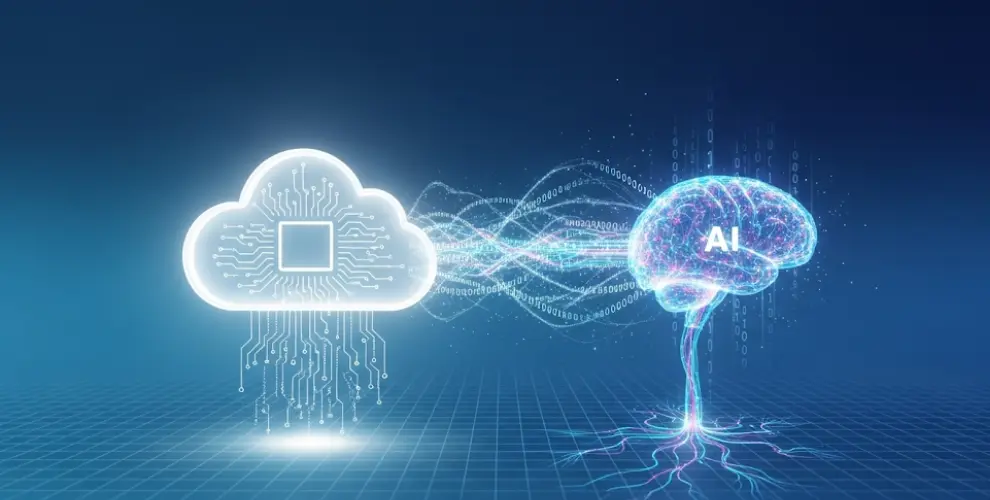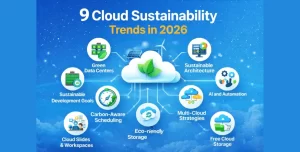
How AI and Cloud Computing Are Merging to Power the Future?
Table of Contents
Introduction
Welcome to WikiGlitz! We have brought you this amazing blog to explore how the synergy between AI and cloud computing is shaping a new digital future. In an era where digital transformation is no longer optional, businesses and innovators worldwide are turning to advanced technologies to fuel productivity, automation, and smart decision-making. Among these, ai and cloud computing stand out as two of the most transformative forces, now merging to create smarter, faster, and more scalable solutions.Key Takeaways
- AI and cloud computing together enable scalable, intelligent services that can adapt to changing user demands across industries.
- Cloud infrastructure accelerates machine learning (ML) operations while reducing the cost and complexity of AI development.
- The combination fuels next-gen innovation in healthcare, finance, education, manufacturing, and cybersecurity globally.
What is AI and Cloud Computing, and Why Are They Merging?
AI and cloud computing are no longer functioning in isolation. AI (Artificial Intelligence) requires significant computational resources to process data, train models, and deliver intelligent insights. Cloud computing provides on-demand access to scalable infrastructure, making it a natural fit for AI workloads. The merging of the two means organizations can:- Develop and deploy AI applications faster
- Avoid large upfront infrastructure costs
- Scale models to global audiences instantly
How Does AI Cloud Computing Transform Traditional Business Operations?
AI cloud computing platforms allow businesses to offload their AI tasks to cloud providers. These platforms include tools that support data preprocessing, model training, and predictive analytics—all without needing local hardware. Key benefits include:- Faster deployment of intelligent features
- Lower infrastructure costs
- Real-time data insights from anywhere
- Seamless updates and security integration
What is the Role of Cloud Computing for AI in Modern Enterprises?
Cloud computing for AI acts as a backbone for handling complex AI workloads. Without the flexibility and scalability of the cloud, AI development can be both expensive and restrictive. Modern cloud providers offer:- AI-ready infrastructure (like GPUs and TPUs)
- Managed AI services (Google Cloud AI, AWS SageMaker, Azure AI)
- Built-in integrations with data lakes and databases
How Does ML Cloud Computing Improve Model Training and Deployment?
ML cloud computing refers specifically to machine learning operations hosted on cloud. These services help streamline the model-building process using pre-built algorithms, low-code tools, and automation. With ML in the cloud:- Data scientists can collaborate remotely in real-time
- Training time is significantly reduced through distributed computing
- Models can be deployed to production with minimal downtime
Why Is AI in Cloud Computing Considered the Future of Digital Innovation?
AI in cloud computing is leading a digital revolution by bringing intelligence directly into cloud workflows. From AI-driven chatbots to voice recognition and fraud detection, intelligent cloud services are redefining how businesses operate. Examples of AI cloud use cases:- Personalized content recommendations on streaming platforms
- Smart virtual assistants in customer service
- Predictive analytics for finance and inventory management
What Are the Key Differences Between Cloud Computing and AI, and How Do They Complement Each Other?
While cloud computing and AI serve different core purposes, they’re increasingly complementary:- Cloud computing delivers the environment (storage, servers, networks)
- AI provides the logic and intelligence that drives decision-making
How Does Cloud-Based AI Enable Real-Time Intelligence?
Cloud based AI allows organizations to perform AI functions—such as data analysis, automation, and personalization—without maintaining their own data centers. Benefits of cloud-based AI:- Easy API integration into existing platforms
- Faster time-to-market for new services
- Automatic scalability during peak usage
What Makes Cloud Artificial Intelligence Critical in 2025 and Beyond?
Cloud artificial intelligence isn’t just a tech trend—it’s foundational to digital transformation. As AI use cases multiply, businesses can no longer afford to rely on traditional systems. Why it matters:- Supports hybrid and remote work ecosystems
- Powers advanced security, fraud prevention, and compliance
- Delivers automation across the enterprise
How Is Artificial Intelligence in Cloud Computing Evolving Globally?
Artificial intelligence in cloud computing is evolving through:- Multi-cloud strategies that allow businesses to leverage strengths from different cloud providers
- Edge computing integration for faster local processing
- Improved energy efficiency and carbon-aware cloud infrastructures
Final Thoughts
In the end, We’ve just explored how AI and cloud computing are merging to build intelligent, scalable, and future-ready digital ecosystems. This convergence is not just powering tech companies—it’s redefining how every industry operates, from healthcare to manufacturing to education. Whether you’re a tech entrepreneur or a curious reader, understanding this synergy is key to staying ahead in a fast-moving digital world. Follow WikiGlitz for more such insights into the technologies shaping tomorrow’s innovations.Frequently Asked Questions (FAQs)
1. What is the connection between AI and cloud computing?
AI and cloud computing are deeply connected as cloud infrastructure provides the scalable computing power needed to build, train, and deploy AI models efficiently. Together, they enable businesses to create intelligent applications without investing in expensive hardware.2. How does cloud computing support AI development?
Cloud computing supports AI by offering on-demand access to high-performance servers, storage, and AI development tools. This allows data scientists and developers to experiment, build, and deploy machine learning models more cost-effectively and at scale.3. What are the benefits of using cloud-based AI services?
Cloud-based AI services offer benefits such as faster deployment, reduced infrastructure costs, real-time data insights, easier integration through APIs, and the ability to scale AI solutions globally with minimal setup.4. Which industries are using AI and cloud computing together?
Industries such as healthcare, finance, education, manufacturing, and retail are leveraging the power of AI and cloud computing to automate processes, personalize experiences, enhance security, and optimize operations.5. What are some popular platforms for AI cloud computing?
Popular platforms include Google Cloud AI, AWS AI and ML tools, Microsoft Azure AI, IBM Watson, and Juniper Mist Cloud. These services offer end-to-end AI development capabilities powered by scalable cloud infrastructure.Want to keep up with our blog?
Our most valuable tips right inside your inbox, once per month.
WikiGlitz Team
Welcome to WikiGlitz, your ultimate destination for tech insights and innovation. Our expert team is dedicated to delivering free resources and professional advice on various technology topics, including Artificial Intelligence, Cyber Security, Cloud Computing, and more. We strive to empower our readers with up-to-date information and practical guidance, ensuring you stay ahead in the rapidly evolving tech landscape. At WikiGlitz, we are passionate about making complex technology accessible to everyone. Our team of seasoned experts curates content that is both informative and engaging, helping you understand and leverage the latest tech trends. Whether you're a tech enthusiast or a professional, WikiGlitz is your go-to source for reliable, expert-driven content. Join us on this journey to explore and embrace the future of technology.





